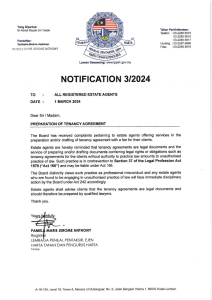
A sales and purchase agreement (SPA) is a binding legal contract between two parties that obligates a transaction between a buyer and a seller. Before a transaction can occur, the buyer and the seller negotiate the price of the item to be sold and the conditions for the transaction. The SPA is a framework for the negotiation process. The SPA is often used in cases of a large purchase, such as a piece of real estate, or frequent purchases over a period. SPA also contain detailed information concerning the buyer and the seller. The agreement records any deposits that have been made as negotiations advance and notes parts of the agreement that have already been met.
1.Seller (Vendor) & Buyer (Purchaser)
The Vendor required legal capacity to pass good title, i.e free from all encumbrances, caveats, chargee to the Purchaser. Whereas the Buyer, being the party that purchases that property, has to pay the purchase price that has been agreed upon failing which deposit will be forfeited.
2.Consideration
The term ‘consideration’ refers to something of value that’s given to someone else, in exchange for goods, services, or some other promise. In a conveyancing transaction, the Seller would transfer his/her home ownership (property is the consideration by the Seller) to the Buyer in exchange for money (payment is the consideration by the Buyer). A deposit of 10% shall be placed upon execution of SPA to guarantee the due performance of both parties, failing which it shall be forfeited and treat it as liquidated damages to the innocent party.
3.Seller Existing Bank (Existing Chargee) & purchaser’s bank (End Financier)
It is common for the Vendor to sell his/her property when the existing loan has not fully paid off. The Vendor’s solicitors is required to obtain Redemption Statement to enable the end-financier to redeem the said Property. Thereafter, a Discharge of Charge shall be signed off by the existing bank and release the title deed to the Purchaser. The seller must ensure the amount that he/she selling is enough to cover their existing debt, failing which sellers must make up the difference (Shortfall of Redemption Sum) by themselves.
4.Conditions Precedent
A condition precedent is a condition or an event that must occur before a right, claim, duty, or interests arises. In a SPA a condition precedent is an event that must occur before the parties are obligated to perform or the contract start to run. For example, there are restriction of interests run with the land, i.e, low cost restriction, bumiputra restriction, foreign interest restriction, leasehold restriction, which parties must apply to State Authority for a consent to sell or purchase. The SPA shall only become unconditional upon the conditions fulfilled.
5.Completion Date
Completion is the point at which the balance of the purchase price paid. The time limit for the payment of balance purchase price in a sub-sale transaction is normally 3 months (“Completion Period”), failing which an extension 1 month (“the Extended Completion Period”) shall be granted to the Purchaser subject to late payment interest of 8% per annum on outstanding balance.
6.Vacant Possession
Vacant possession is when you, the buyer can finally start moving in and using the property undisturbed. That means no more construction, no more occupants, and no more of the ex-occupant’s stuff. Delivery of vacant possession on the other hand, is when the property is handed over to you. In other words, the delivery of access keys and cards to your newly purchased property. The Purchaser is entitle to charge late delivery Interest on Vendor for late delivery.
7.Apportionment of Outgoings
Upon completion, the Vendor shall settle all arrears of quit rents, assessments, sinking funds, taxes, electricity, water, tele-communication, maintenance and sewerage charges and other charges, if any, (“the Outgoings”) incurred by the Vendor or the occupiers of the said Property up to the date of delivery of the Vacant Possession. The Outgoings of the said Property for the current year shall be apportioned between the Vendor and the Purchaser as at the date of delivery of the Vacant Possession of the said Property. The buyer will be responsible for the outgoings thereafter.
8.Defaults & Termination
Due to an unforeseen change of circumstances, it’s possible that one party may choose to breach the agreement, or wish to end the SPA from their end. The termination clause shall regulates the rights the innocent party may ensue, and will be compensated by the defaulters.
9.Differential Sum
Diffential sum can be refer to differential sum between the purchase price and loan financing , between the redemption sum and purchase price, or between retention sum submitted to LHDN and RPGT tax incurred. Relevant party shall make up relevant shortfall to prevent penalty imposed.
10.Adjudication
Adjudication refers to a process to submit relevant instruments i.e. MOT, to LHDN to determine the amount of stamp duty payable. The adjudicated value shall depend on the property valuation given by the JPPH and the related party shall pay the amount of stamp duty accordingly within 30 days of the Notice of Assessment issued, failing which a penalty will be imposed for late payment.







